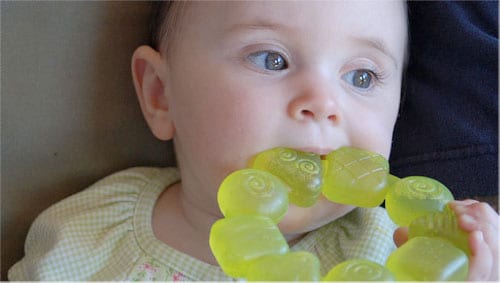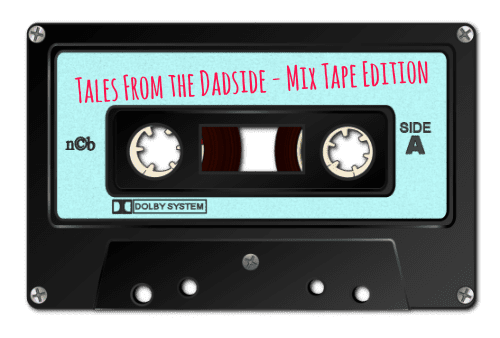Teething Troubles

As a pediatric dentist, I see patients from birth to age twenty-one. In one chair there may be a college age teen who needs his wisdom teeth removed, and in the next, an eight month old with new teeth just coming in. Yes, we see such young babies. It is important to have the first visit to the dentist by age one or within six months after the first tooth erupts to establish preventive strategies and make sure dental development is progressing normally.
What concerns many parents are the teething problems associated with the erupting baby teeth. As the new tooth gets closer to the surface, the gum thins out and you often can see the new tooth bulging right under the thin gum tissue. Eventually, the gum opens up and the gentile eruptive force of the new tooth moves the tooth up into the mouth.
When do the teeth come in?
Well, that varies a lot from child to child. Typically, you might expect the first baby tooth to come in around 6 months of age. I see as early as three months and many who are one year of age who don’t yet have their first tooth. There are actually some kids who are born with a tooth already in place! The first tooth to come in is typically the lower front incisor. After that, the order varies with the front four upper and lower teeth coming in first, then the first molars in the back around one year of age or so. Again, there is a lot of variability. If you are concerned about any delay, see your pediatric dentist.
Does teething usually cause discomfort?
Most of the time babies do not complain much at all when getting their new teeth. There are, however, times when there are the typical symptoms of teething discomfort. Many children will begin to drool more than usual. It’s normal for babies to put things in their mouth exploring textures, but they may want to chew objects a little more than usual to massage the sore gum areas. They may be grumpy, become more agitated than usual, or even run a slight fever. Mild diarrhea the day the tooth comes in is not unusual. Constant or severe diarrhea is not normal and should be evaluated by the pediatrician.
Is fever normal with teething?
I caution parents to not be too quick to blame a high fever on teething. New teeth erupting can cause a slightly elevated temperature. A fever of one hundred or higher should always be looked at with concern as young children are also susceptible to a myriad of conditions that can also cause a fever. Ear infections are a very common cause of high fevers in babies. I occasionally see young children with a high fever, multiple oral ulcers who are not eating and are pretty much miserable. This is not teething, this is an infection caused by the same virus that causes cold sores. There are many other infections and conditions that can cause a baby to drool, complain and have a high fever, so consult your pediatrician if the fever gets high, or if you are just not sure.
What can you do to relieve any discomfort?
I suggest using cold teething rings or something soft (and safe) so they can chew and help them to feel better. There is some concern recently about the liberal use of Baby Oragel. This is the cream with benzocaine, a topical anesthetic that numbs the immediate area when placed on the gums. I have not seen any definitive study that would cause any concern so long as you use it in a limited manner. Place a small amount on the gums where the tooth is erupting to provide temporary relief. Tylenol is ok in appropriate dosages if the child is particularly grumpy or has a low-grade fever; but again, do not dismiss a high fever as just teething.
[box style=”lavender rounded” ]ABOUT THE AUTHORDean C. Brandon, D.M.D. is a pediatric dentist at Alabama Pediatric Dental Associates and Orthodontics and an adjunct assistant professor at the The University of Alabama School of Dentistry. [/box]
As a hyper-local website focused on all aspects of parenting in and around Morgan County, and the Tennessee Valley, River City Mom occasionally asks local parents to submit their stories for publication. This is part of our continual effort to represent varied viewpoints and experiences on our site. However, these articles should not be seen as necessarily expressing the views of Rocket City Mom Media Group, LLC.









